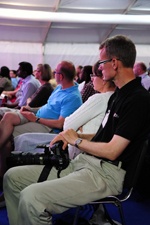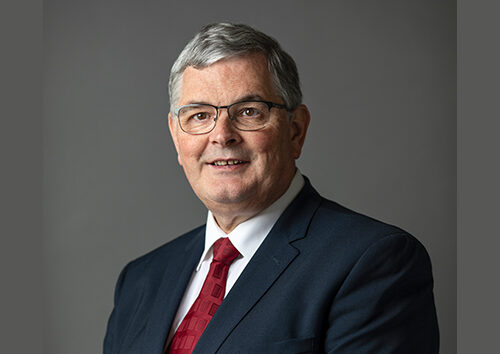Presented by Lowell Cooper
23 August, 2012 Rogaška Slatina, Slovenia [John Surridge, tedNEWS] “There is a crisis in confidence in leaders,” said Elder Lowell Cooper in his opening words to the European Pastors Council on Thursday morning. “Leaders are held in suspicion. And yet,” he continued, “a trustworthy God will never be made know by untrustworthy people.”
With these challenging, yet honest, observations Elder Cooper went on to say that the most important human resource for the church is trust. Leadership is demonstrated by people who have both information and influence, but their position brings certain inevitable consequences: leaders will always be judged by higher standards than those set for the general public, and furthermore, “the microphone is always on” for leaders. So, said Elder Cooper, we need to discuss what kind of standards or “code of conduct” we should apply to ourselves and to others in positions of leadership in the church today.
The code of conduct suggested by Cooper was based on seven key principles: humility, integrity, trust, respect, accountability, collaboration and excellence. Systematically working through this list, with the aid of numerous PowerPoint slides and more than a hundred bullet points, texts and quotes, he highlighted those areas that would be of particular interest to the assembled pastors.
“Humility is a much misunderstood concept today,” he said. “By many it is thought of as weakness or insecurity and leaders in the world are thought to need a huge ego.” In the church however things have to be different. Humility is an essential quality for the church leader.
In relation to integrity, Elder Cooper quoted an African proverb: “A crooked stick casts a crooked shadow.” Leadership positions carry inherent risks and we have to guard against them. What is the best way to do this? Be objective and fair. Admit your mistakes. Accept that you don’t have all the answers. Maintain an inner spiritual life that anchors the outer life.
 Trust is an essential foundation for any organization and, according to Cooper, two things are required for its establishment: moral character and competence. These are significant at two levels – the personal level and the corporate level. Breaking this down to specifics, he stressed the importance of maintaining confidentiality, while at the same time being transparent with the information that it is legitimate to share.
Trust is an essential foundation for any organization and, according to Cooper, two things are required for its establishment: moral character and competence. These are significant at two levels – the personal level and the corporate level. Breaking this down to specifics, he stressed the importance of maintaining confidentiality, while at the same time being transparent with the information that it is legitimate to share.
Cooper’s definition of respect included placing genuine value on a person or thing, and treating people with dignity, honesty, and fairness. Once again humility comes into the equation. “Leaders can often be seen as speaking authoritatively for the whole organization,” he said, “but no leader knows everything. It is an act of respect to acknowledge this fact.”
On the fifth topic of accountability Cooper said, “People have a right to expect their leaders to walk the walk.” Again though, this needs to be realistic. It does mean sticking to the policies of the organization and being loyal to its purposes, but it can still leave room for initiative, questioning and experimenting.
Something that is becoming more and more important in this age of hi-tech communication is collaboration. Although teamwork has always been a key characteristic of good leaders today it is impossible to avoid. “Anyone who believes that they are the centre of everything is heading for disaster,” according to Cooper. In the church we cannot afford to encourage a celebrity mentality. Self-centred people cannot function well in a team.
Elder Cooper concluded with the issue of excellence. “Everything God does is characterized by excellence,” he said. And yet, it is possible to be sidetracked into focusing on the symbols of rather than the substance of excellence. Professionalism, while important, should not become an end in itself. Personal advancement, while commendable, must be both intellectual and spiritual. In additional to personal excellence we need to create a “culture” of excellence within our organizations, Elder Cooper concluded. [tedNEWS]
tedNEWS Staff: Miroslav Pujic, director; Deana Stojkovic, editor; Dragana Selakovic-Duval, Frederic Duval & Tor Tjeransen, photographers
119 St Peter’s Street, St Albans, Herts, AL1 3EY, England
E-mail: [email protected]
Website: www.ted-adventist.org
tedNEWS is an information bulletin issued by the communication department of the Seventh-day Adventist Church in the Trans-European Division.
You are free to re-print any portion of the bulletin without need for special permission. However, we kindly request that you identify tedNEWS whenever you publish these materials.


